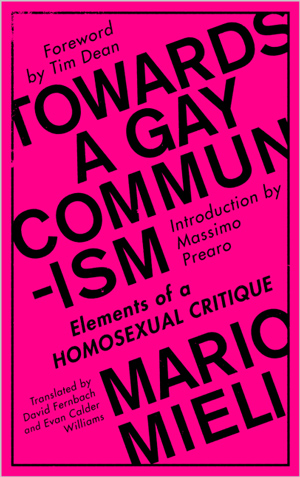Innovative and controversial in its day, Towards a Gay Communism is among other things a vivid document of a time when sexual liberation was a wing of the revolutionary struggle. An idiosyncratic synthesis of 1970s Italian radicalism, psychoanalysis, and Marxist feminism, Mieli’s provocation both shows his vintage and retains a critical urgency. The following is an excerpt from a new translation from Pluto Press.
•
As long as women reject or fear the sexual approach of another woman, as long as men are at pains to guarantee and defend the virginity of their own asshole, the reign of freedom will not have been attained; this is the certainty from which the homosexual perspective illuminates the future. —Mario Rossi
I believe that this conclusion does not add anything new to what has been discussed and maintained in the preceding pages. It is simply a concise synthesis of the main perspectives that arise from an analysis of the homosexual situation. Those who have followed me to this point, therefore, will find in these last pages a kind of recapitulation of what they should by now have understood. For those who instead have started by casting an eye at the conclusion (and it’s not just a few who do this), the unusual assertions that follow should arouse them either to read the whole book from the first page, or to throw it out of the window, acknowledging in this way that they are not interested (or perhaps too much so ...) in a reading of this sort, of certain hypotheses.
From criticism of the ideology of heterosexual primacy and from an examination of the homosexual question and the rich themes inherent in the liberation of Eros, it is possible and indeed necessary to draw hypothetical conclusions—and more than hypothetical—for the future of the human race. These conclusions present themselves as the result of consequences derivable from the present movement of the sexual dialectic in the context of human emancipation: unless—and at this point we have to put forward the contrary hypothesis—revolution and communism do not replace the destruction, war and the biological annihilation of the species, to which capital’s lethal rule tends.
1. The liberation of Eros and the emancipation of the human race pass necessarily—and this is a gay necessity—through the liberation of homoeroticism, which includes an end to the persecution of manifest homosexuals and the concrete expression of the homoerotic component of desire on the part of all human beings. Baisé soit qui mal y pense.
2. The liberation of sexuality, moreover, includes the complete recognition and the concrete manifestation of erotic desire for persons of the other sex on the part of homosexual men and women, and the realisation of a new gay way of loving between women and men.
3. The (re)conquest of Eros determines the overcoming of the present coercive forms in which both heterosexuality and homosexuality are manifested. This means that the liberation, which is above all a liberation of gay desire, will also lead, not only to the negation of heterosexuality as a heterosexual Norm, but also to the transformation of homosexuality, which today is still in large part subject to the dictatorship of this Norm. The antithesis of heterosexuality and homosexuality will be overcome in this way, and substituted by a transsexual synthesis; no longer will there be hetero- and homosexuals, but polysexual, transsexual human beings; better, instead of hetero- and homosexuals there will be human beings. The species will have (re)found itself.
4. The freed Eros will be transsexual, also because the liberation of homosexuality and the abolition of repressive heterosexual primacy will have promoted and determined the complete dis-inhibition and liberation of the deeply hermaphroditic nature of desire, which is transsexual (psychoanalysis would reductively say bisexual), whether in the face of its “objects” or in the subject.
5. The discovery and progressive liberation of the transsexuality of the subject will lead to the negation of the polarity between the sexes and to the utopian (in the revolutionary sense of utopia-eutopia) achievement of the new man-woman or, far more likely, woman-man.
6. But the (almost) mirror-like resemblance, even in difference, between the object of transsexual desire and the transsexual desiring subject will lead to a recognition of the subject in the object and in this way to the creation of true intersubjective reciprocity. From the sexual point of view, this will mean the (re)conquest of the human community, and the liberated Eros will no longer be separated from other expressions of community. Cured of neuroses, sexuality can be grasped clearly, freed from the sense of guilt, as well as in the social and scientific-artistic forms of its positive sublimation, as now the true Renaissance will take place. Positive sublimation (sublime action) will substitute itself completely for labour understood as alienated and coercive, and for the sterile and self-destructive sublimation in which the greater part of neurotic “free” time is today lost. All human beings will know themselves, and no longer from an individualistic point of view, which will be overcome, but rather from a transsexual, intersubjective and communitarian one: this consciousness will break down the barriers between Ego and non-Ego, between self and others, between body and intellect, between word and deed.
7. In order that the liberation of homosexuality, transsexuality and human emancipation be accomplished, the assertion of the revolutionary movement of women is necessary, as being concrete historical subjects of the universal antithesis to the masculine power presently in force, they will overturn this power, transforming their antithetical position through revolution, bringing about the collapse of the system of repression of Eros that is absolutely functional to it, starting with the heterosexual Norm and the rejection of homosexuality.
8. The collapse of the phallocratic system includes the collapse of the capitalist system, which rests on the masculinist and heterosexual foundation of society and on the repression and exploitation of Eros that together guarantee the perpetuation of alienated labour and hence the rule of capital. The revolutionary proletariat and the movement of revolutionary women are the two faces of the communist/human-community party, and the movement of revolutionary homosexuals is its ass. Like transsexuality itself, the revolutionary movement is one and multiple.
9. If the assertion of the movement of conscious homosexuals contributes to making the communist (and) women’s movement revolutionary, the progressive liberation of other repressed erotic tendencies will make it ever more gay. The presence today, for example, of a subversive organisation of sadomasochist homosexuals in the USA shows that, from a perspective opposed to the destructive totalisation of capital, we are moving in the direction of the complete liberation of desire. We cannot imagine the importance of the contribution made to the revolution and to human emancipation by the steady liberation of sadism, masochism, pederasty in the proper sense of the term, gerontophilia, necrophilia, zooerastia, autoeroticism, fetishism, scatology, urophilia, exhibitionism, voyeurism, etc., in the first person to the dis-inhibition and concrete expression of these tendencies in our own desire, if we don’t refer to the practical and theoretical work of those who already live in an open way one or more of the so-called “perverse” desires, without forgetting that, often, the most “perverse” are those who get defined as “schizophrenic”.
In particular, if we aspire to the achievement of transsexuality, we cannot avoid recognising in those who are physiologically or even solely psychologically transsexual today (in the drama of their individual lives, outlawed by the repressive system of the individualist monosexual “normals” with their enclosed lives) the unique contemporary and concrete expression, always persecuted and far from a free existence, of the “miraculous” range and scope of desire, of Eros. “The miracle is that there is nothing miraculous there” (Sartre).

